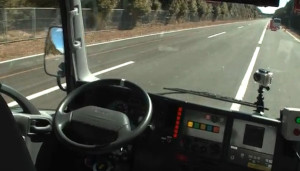Things are certainly changing in the trucking industry. Even though demand is rising, the industry is facing a monumental challenge in its shortage of qualified and licensed drivers. The driver shortage has been at the forefront of trucking news for some time, and we have certainly covered it here at Logistics Viewpoints. With the ongoing investments in research and development for driverless vehicles, could this be the solution to the driver shortage?
 Driverless cars have been receiving the lion’s share of buzz lately. But they are not the only vehicles out there. In fact, driverless trucks are already operating at iron ore mines in Pilbara, Western Australia. The trucks were brought in to alleviate safety concerns for drivers, while increasing efficiency. These trucks are mostly operating on deserted dirt roads, not driving through crowded cities. But that could all change soon.
Driverless cars have been receiving the lion’s share of buzz lately. But they are not the only vehicles out there. In fact, driverless trucks are already operating at iron ore mines in Pilbara, Western Australia. The trucks were brought in to alleviate safety concerns for drivers, while increasing efficiency. These trucks are mostly operating on deserted dirt roads, not driving through crowded cities. But that could all change soon.
 Pretty much every car and truck company out there is testing driverless trucks, and it is only a matter of time before they hit the road. Not only could driverless trucks combat the driver shortage, there a number of other tangible benefits that can be felt. First, current regulations dictate the number of hours a driver can be behind the wheel. These regulations vary by country, but the bottom line is that each driver can only log so many hours a day or week. With driverless trucks, the trucks could drive 24 hours a day, while only stopping to re-fuel. There would be no mandated work stoppages or rest times. There would be no time lost to meals and snacks. There would be no time lost to sleep. The trucks can just keep going. This will cut down on the transit time to deliver goods, which will reduce overall costs.
Pretty much every car and truck company out there is testing driverless trucks, and it is only a matter of time before they hit the road. Not only could driverless trucks combat the driver shortage, there a number of other tangible benefits that can be felt. First, current regulations dictate the number of hours a driver can be behind the wheel. These regulations vary by country, but the bottom line is that each driver can only log so many hours a day or week. With driverless trucks, the trucks could drive 24 hours a day, while only stopping to re-fuel. There would be no mandated work stoppages or rest times. There would be no time lost to meals and snacks. There would be no time lost to sleep. The trucks can just keep going. This will cut down on the transit time to deliver goods, which will reduce overall costs.
Second, safety concerns of fatigued drivers will no longer exist. Driver fatigue is a serious issue in the trucking industry. For that reason, regulations exist to limit driving times. With smart trucks, there is no chance of human error on the road. In fact, there is not even human interaction. The trucks will not need to rest or reset themselves. Instead, they can continue to drive through the night.
Third, resources can be dedicated to other tasks. Freight turnover will increase due to shorter transit times. As a result, money can be invested in other areas of labor to speed up the loading / unloading process. The quicker trucks can be loaded and unloaded, the quicker they are back on the road. However, the increased use of automation could eventually lead to driverless trucks delivering goods to staff-less warehouses, with conveyors and scanners for unloading the trucks.
The looming question, however, is whether or not a driver needs to be in the driverless truck “just in case.” As driverless trucks become a reality, this will be a key question. If human drivers are needed in the trucks, the driver shortage will still be felt. However, drivers could use the time in the truck to complete other tasks for the company. This essentially gives the “driver” double duty, which will also save the company time, money, and resources. For example, drivers could complete invoices and send them out while the truck drives itself. Conversely, if human drivers are not needed in the truck, it can be the solution to the driver shortage. Then the question becomes, what about the drivers?

















Great article – I really think that driverless logistics will be THE gamechanger of global commerce in the next 10-20 years. In July last year, Daimler tested their driverless truck on the Autobahn – showing how close we are to seeing them on the road. Laws and regulations need to catch up with technology – similar to aerial drones – but driverless vehicles are making quicker progress than drones. I think the most realistic near-term plan would be drivers still manually navigating cities, but then the autopilot can navigate long highway runs. Another great article on this subject is from the Wall Street Journal called “Daddy, What Was a Truck Driver,” about how the truck driver may be an obsolete profession soon. (http://www.wsj.com/articles/SB10001424127887324144304578624221804774116)